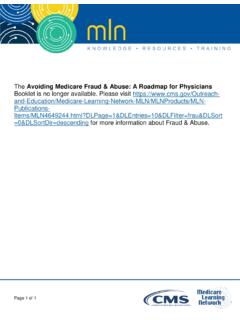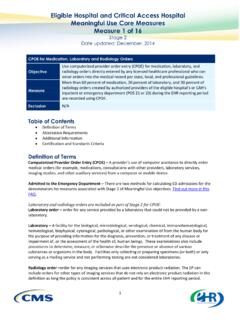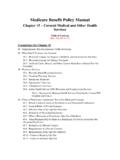Transcription of Physician Self-Referral Law Frequently Asked Questions
1 Center for Medicare & Medicaid Services Physician Self-Referral Law Frequently Asked Questions The following FAQs relating to this topic are collected here for your convenience. The FAQs have not been revised since they were originally issued unless otherwise noted. Any Questions regarding these FAQs or the Physician Self-Referral law should be directed to the CMS Physician Self-Referral Call Center at Q. What is a Physician practice within the definition of Physician organization at 42 A. A Physician practice is a medical practice comprised of two or more physicians organized to provide patient care services (regardless of its legal form or ownership). For example, a Physician practice may be a group of physicians that practice together but do not meet all of the requirements of for group practices that qualify to use the Physician services and in-office ancillary services exceptions. We note that the provision of patient care services by employed or contracted physicians does not automatically cause an entity to become or be considered a Physician practice (and, thus, a Physician organization ).
2 For example, a hospital, which, in general terms, is an institution that provides medical, surgical, or psychiatric care and treatment for the sick or the injured, is not considered a Physician practice or Physician organization even though it employs or contracts with two or more physicians to provide patient care services to its inpatients and outpatients. (FAQ2327) [Last revised May 18, 2017 to clarify that the Physician services and in-office ancillary services exceptions are only available to entities that qualify as group practices in accordance with 42 ]. Q. Is Physician ownership a prerequisite for meeting the definition of Physician organization or Physician practice ? In other words, must all Physician organizations . or Physician practices have at least one Physician owner? A. No. Physician ownership is not determinative as to whether an entity (regardless of its legal form , for example, limited liability company, professional corporation, etc.)
3 Is a Physician organization. We note that 42 states that, with respect to a group practice (which is a Physician organization ), the single legal entity that is the group practice may be organized by any party or parties, including, but not limited to, physicians, health care facilities, or other persons or entities. Likewise, Physician ownership is not determinative as to whether an entity (regardless of its legal form , for example, limited liability company, professional corporation, etc.) is a Physician practice. (FAQ2337). Q. Is a federally qualified health center a Physician organization"? A. No. A federally qualified health center (as defined at 42 (b)) is not a Physician organization as defined at Federally qualified health centers are subject to the conditions for coverage at 42 Part 491. These regulations require, among other things, that the federally qualified health center have written policies and procedures, disclosure of certain information to patients , minimum staffing composition and levels, and that the federally qualified health center provides medical emergency procedures as a first response to common life-threatening injuries and acute illness.
4 Federally qualified health centers may share some characteristics with Physician medical practices. However, federally qualified health centers typically are not structured as Physician medical practices in the traditional sense, nor are Physician medical practices required to meet the same conditions for coverage as federally qualified health centers. (FAQ12308). Q. If a hospital (or other Part A provider) directly employs or contracts with physicians to provide Physician services to hospital patients , does that make the hospital (or other Part A provider) a Physician organization ? A. A hospital (or other Part A provider) is not considered to be a Physician organization . simply because it has employment or contractual arrangements with physicians for the provision of patient care services. (FAQ2329 renumbered as FAQ12310). Q. Is a staffing company a Physician organization"? A. A staffing company that does not directly provide and bill for patient care services, but merely facilitates the provision of physicians to hospitals and other health care providers, is not a Physician organization as defined at 42 (FAQ12312).
5 Q. Please provide some examples of organizations, providers, or other entities that are NOT Physician organizations as defined at 42 A. The following are examples of organizations, providers, or other entities that are NOT. Physician organizations. This list is illustrative, not exclusive: Hospitals and other Part A providers of services Federally qualified health centers A single legal entity (that does not satisfy the requirements of a group practice for purposes of ) that encompasses (that is, operates) a faculty practice plan AND either a medical school or hospital, or both A medical school that does not operate a faculty practice plan but employs physicians to provide clinical and academic service (FAQ2331 renumbered as FAQ12314). Q. Consider the following facts. A Physician group practice (Group Practice 1) has a written contractual agreement with another Physician group practice (Group Practice 2). for the services of a Physician in Group Practice 2.
6 Group Practice 1 would bill Medicare for the services of the Physician ( Physician A) as Group Practice 1 services. Must Physician A sign a contractual agreement directly with Group Practice 1 in order to be considered a Physician in the group practice with respect to Group Practice 1 (so as to permit Group Practice 1 to bill for the services provided to its patients by Physician A)? A. In order to be considered a Physician in the group practice, as defined at 42 , an independent contractor Physician must furnish patient care services for the group practice under a contractual arrangement directly with the group practice to provide services to the group practice's patients in the group practice's facilities. Under the specific factual scenario described, Physician A may either sign an agreement directly with Group Practice 1 or sign the agreement between Group Practice 1 and Group Practice 2. If the latter option is selected, the written agreement between Group Practice 1 and Group Practice 2 must identify Physician A by name and also identify the services that he or she is to perform for Group Practice 1.
7 As set forth in our 2015 clarifying guidance, a single formal contract or agreement is not required to satisfy the writing requirement of many of the exceptions to the Physician Self-Referral law. (See 80 FR. 41686, 41915 (Jul. 15, 2016) and 80 FR 70886, 71314-15 (Nov. 16, 2015).) If a collection of documents is used to satisfy the writing requirement, Physician A's signature must appear in written documentation evidencing an arrangement: (i) directly between Physician A and Group Practice 1; or (ii) between Group Practice 1 and Group Practice 2. If the latter option is selected, the written documentation must identify Physician A by name and also identify the services that he or she is to perform for Group Practice 1. (FAQ10136) [Last revised May 18, 2017 to clarify the writing and signature requirements in applicable exceptions to the Physician Self-Referral law.]. Q. Is the exception for Physician recruitment in 42 (e) available to a hospital that wants to recruit a resident it has trained?
8 Assume that the resident already resides in the geographic area served by the hospital (as defined in (e)(2)). A. The exception in (e)(3) may be available to the hospital for the provision of recruitment assistance to the resident upon completion of the residency. When all of the requirements of (e) are satisfied, the exception protects remuneration provided by a hospital to a Physician to induce the Physician to relocate his or her medical practice into the geographic area served by the hospital in order to become a member of the hospital's medical staff. In the case of a resident, the resident need not relocate a medical practice, provided that the resident establishes his or medical practice in the geographic area served by the recruiting hospital. However, the resident must become a member of the hospital's medical staff. 1. Resident is not a member of the organized medical staff. To the extent that, during his or her residency, the resident is not considered to be part of the hospital's organized medical staff, the exception in (e) would be available to the hospital.
9 CMS recognizes that, often, residents do not join the organized medical staff of the training hospital until their training is complete and they are able to practice without supervision. Having privileges or permission to provide patient care services only under the supervision of an attending Physician (in the case of residents) is not necessarily the same as being a member of the medical staff. We note that this discussion is limited to residents and any activities that occur within the scope of their training programs. If a resident moonlights, he or she may be a member of the organized medical staff of the hospital at which he or she moonlights. Of course, as always, all of the requirements of an exception must be satisfied in order for remuneration to comply with the Physician Self-Referral rules. 2. Resident is a member of the organized medical staff, but such membership is coterminous with his or her employment with the training hospital. If the resident's privileges terminate (for example, pursuant to a provision in the medical staff bylaws or the resident's employment contract) at the end of his or her residency and the Physician (formerly the resident ) is not considered a member of the medical staff upon the completion of the residency, the hospital may use the exception at (e).
10 To provide a recruitment payment to the Physician , provided that all of the requirements of the exception are satisfied at the time of the arrangement. We caution that this answer is contingent upon: (1) the coterminous nature of the medical staff membership having been established prior to the parties entering into the recruitment arrangement; and (2). consideration provided by either party pursuant to the recruitment arrangement not occurring until after the termination of the Physician 's medical staff membership as a resident. (FAQ2333). Q. Do the provisions regarding termination/amendment of leases apply to personal services arrangements? A. Yes. As stated in the Phase III final rule, a personal service contract can be amended in the same manner as an office space or equipment lease (72 FR 51012, 51047 (Sep. 5, 2007)). The provisions regarding termination/amendment of office space and equipment leases (see 72. FR at 51044) apply to personal service arrangements.









